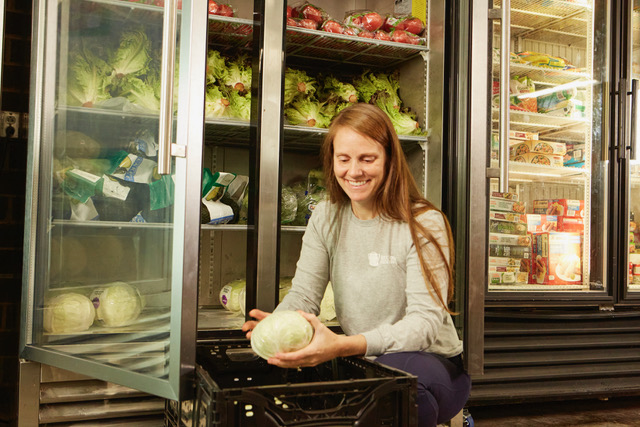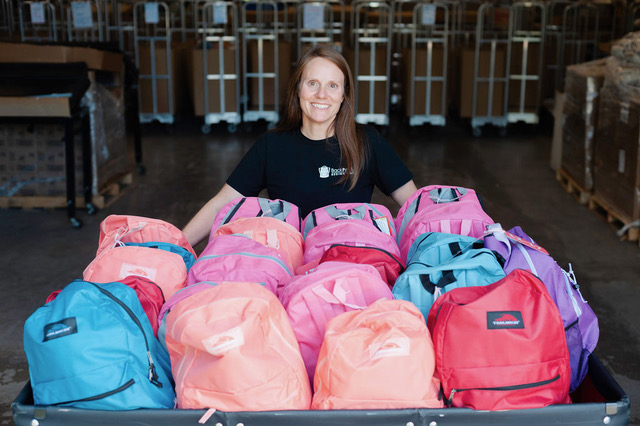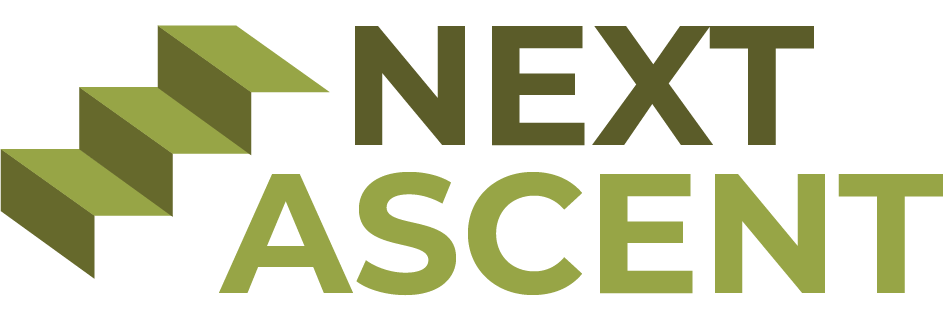How Next Ascent used Appreciative Inquiry to transform strategic planning for BackPack Beginnings
BackPack Beginnings makes a tangible difference in the lives of children and families in the heart of our community. What started as one woman’s desire to address childhood hunger has blossomed into a comprehensive support system that reaches more than 25,000 children each year with food, clothing, books, and personal care items.
Next Ascent had the privilege of working with BackPack Beginnings in 2022. Today, we’re talking with founder Parker White to see how our strategic planning approach set the stage for positive growth for this inspiring organization that serves such a critical need in our community.
When we first connected with Parker, it was clear that the organization was at a pivotal point. They had experienced significant growth, having recently moved into a much larger space and launched a new Family Market program. This expansion was fantastic but also meant their existing strategic plan was no longer sufficient. They needed a roadmap to guide them into an exciting new chapter.
That’s where we came in. We proposed a strategic planning process grounded in Appreciative Inquiry, a strength-based approach that identifies what’s working well and builds upon those successes.

Kate Weaver: Parker, I love your origin story. Let’s go back about 15 years. What inspired you to start BackPack Beginnings?
Parker White: “It started with a news program I saw about a teacher in Texas who was sneaking food into her students’ backpacks. She noticed they were returning to school on Mondays, hungry and unable to learn and concentrate. That news program really stuck with me. Then, after having my first child, I realized how dependent she was on me for all her basic needs, and I thought about parents who loved their kids just as much but didn’t have the means to provide for them. So that sparked something in me. I had also done some enneagram work, which plays into the social justice piece of who I am. Even as a child, I was involved in nonprofits, and in college, I did fundraising and worked with nonprofits, so this has been a theme of my life.”
Kate Weaver: When you started BackPack Beginnings, you had a two-year-old and another one on the way, is that right?
Parker White: “Yes, and I definitely wasn’t trying to start a nonprofit. I just wanted to find a small way to give back. I kept feeling God nudging me, telling me to do something like this.”
Kate Weaver: BackPack Beginnings has grown significantly, especially with the addition of the Family Market, which gives families the joy of picking out their own groceries and supplies. It was around that time you came to us for strategic planning support. How did that change your strategic needs?
Parker White: “The Family Market was a game-changer. It was a completely new program for us. It was the first time we were working directly with clients versus serving as the middle-woman. We were building relationships with our Family Market guests and hearing of other needs they had, and we just saw a real potential to go deeper. So, our old strategic plan didn’t apply to where we were anymore. As a board, we felt we needed to reconsider if our current mission and values reflected the work we’re doing now. How can we reformulate what the next few years look like, knowing that the Family Market would be a huge part of it?”
Kate Weaver: So, you decided to engage with Next Ascent. What were you hoping to achieve through this process?
Parker White: “We knew we needed a strategic plan, but we wanted to ensure we’d make a plan that was tangible, actionable, and that we would actually use. I’m the kind of person who needs a written plan, not just bullet points. I don’t like big, vague ideas. I need it written, and we need to do it together. You all were great about getting to know who we are. You toured the space, learned about our work, and by the time we had our actual session with you and the larger team, you really knew us.”
Kate Weaver: Let’s talk about the session. I remember that you were initially skeptical about our Appreciative Inquiry approach. I’d love for you to share your initial hesitations.
Parker White: “I hadn’t heard of Appreciative Inquiry, and I’ll be honest, I pushed back on it big time (laughs). I’m a bit of a control freak, and I like to fix things that aren’t working. So, the idea of focusing mostly on the positives felt counterintuitive. I thought, ‘Wait a second, we’re not going to talk about what we’re doing wrong or what we can improve on?’ But Pam really sold me on the idea. She explained that by focusing on strengths, we could start from a position of success and achieve more than if we start from a position of weakness. It took a bit of a mind shift, and it all worked really well. It’s the strongest strategic plan we’ve had.”

Kate Weaver: Earlier, you mentioned that it’s extremely important to you to emerge from strategic planning with something tangible and actionable. Is that what you walked away with?
Parker White: “We came out of this with such wonderful ideas and tangible takeaways: short-term ‘yes, we can do this’ things, long-term ideas, and a combination. Everybody in the room at the strategic inquiry session felt that energy. Nobody was asking, ‘What is BackPack Beginnings doing wrong? What should they get rid of? Instead, they were asking, ‘What are their strengths? What are they doing well?’ The tables were mixed up with a lot of different people sharing different perspectives and ideas. Hearing our stakeholders talk in this positive way was energizing.”
Kate Weaver: When it came to the actual strategic inquiry session, what did you find most valuable?
Parker White: “Several things, but definitely how inclusive it was. In the past, our strategic planning always involved just the staff and board. But you and Pam really pushed us to invite a broader range of people, and again, I’ll be honest, I pushed back. I didn’t think people swamped with their own work and responsibilities would want to participate in our morning session. But I was wrong. Almost everyone we invited said ‘yes,’ and we definitely have a stronger plan because we involved the larger group.”
Kate Weaver: Why do you think that is?
Parker White: With 55-60 volunteers, staff, social workers, partners, and donors in the room, the energy was amazing. The table discussions, one-on-one conversations, and structured brainstorming sessions generated so many great ideas. There were things said by the participants that we had already been thinking about, which lent power to our ideas.
Kate Weaver: Tell me about a specific moment that stood out to you.
Parker White: “I can’t remember the exact prompt, but each table ended up presenting ideas on these big sheets of paper that were visual representations of all the possibilities for BackPack Beginnings. When people stood up with these long sheets of ideas, I was like, “Yes, yes, let’s do this!” There were big, crazy ideas and small, tangible ones. I loved hearing what people thought about our potential and where we could go. I also liked hearing things we had already been considering because it gave validity to our thinking. I love growth and innovative ideas, and I’m not great at standing still, so that experience was really exciting for me.”
Kate Weaver: It’s always powerful to see that kind of enthusiasm. In what way has the Appreciative Inquiry approach stuck with you and had staying power?
Parker White: “This is the one and only strategic plan that we actually feel like the action steps have been a great to-do list for us. They gave us a really great scorecard for measuring ourselves. This is a plan that we revisit every six months. We use the action steps as a ‘red, yellow, green’ assessment tool to see what we’ve accomplished. So, it’s a living document that guides our decisions and keeps us focused. I even find myself using the Appreciative Inquiry approach in my personal life now.”
Kate Weaver: That’s wonderful to hear. Any final thoughts for other organizations considering strategic planning?
Parker White: “I highly recommend it. I am really happy with the outcome. It was so worth the time and effort. After our first meeting, when Pam and you described what Appreciative Inquiry was and what she envisioned we would get out of it, I was quickly a believer. As we continued to have conversations and meetings, I was more and more convinced that this was the way to go about strategic planning.”
If you’re interested in learning more about BackPack Beginnings or supporting their mission, visit their website at backpackbeginnings.org.
